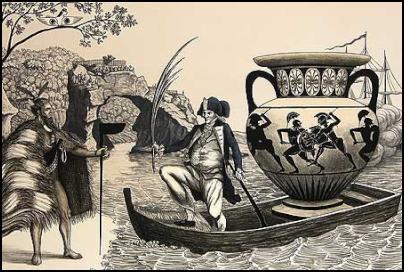Museums and universities can learn from each other
Friday, 6 November 2015, 3:06 pm
Press Release: Massey University

Image: (from conference poster) Captain Cook makes his Approach from the West, from the Odyssey of Captain Cook, 2005 lithograph series by Marian Maguire (Massey University Art Collection Manawatū)
Friday, November 6, 2015
Museums and universities can learn from each other
Museums and universities have a lot to learn from each other but can sometimes inhabit parallel universes, says Massey University historian Associate Professor Kerry Taylor.
He hopes an Australasian conference in Auckland next week, which brings together humanities scholars and museum researchers from around New Zealand, Australia, Singapore and Canada, will spark new conversations and networks.
“People in academia and people in museums often tend to do things separately – there are a lot of missed opportunities for collaboration and sharing our knowledge,” says Dr Taylor, head of Massey’s School of Humanities and director of the W. H. Oliver Humanities Research Academy.
Increasingly, historians are exploring cultural material as the focus of research, bringing them closer to the kinds of research done by museums, Dr Taylor says. He is currently researching the politics of protest in New Zealand through cultural material for a forthcoming book, and is examining banners, posters, badges, clothing and other paraphernalia of protest movements throughout the 20th century to the present day.
Advertisement - scroll to continue reading
“I think it highlights that there is a lot of potential for young and emerging researchers to find new themes and ways of looking at history,” he says. Museums – both large and small – may have ideas and items worthy of further research by postgraduate students. Alternately, there are academic researchers whose projects may provide the basis for public exhibitions in museums, if stronger links can be forged, Dr Taylor says.
Other trends in humanities research to be explored at the conference, titled Humanities Without Borders: Humanities across disciplines, cultures and regions, include the contribution of indigenous research centres to scholarship and museums.
Cross-cultural and cross-disciplinary research developments are also adding to our increasingly complex understandings of history and culture, Dr Taylor says. Leaders from centres on Māori, Pacific and Australian Aboriginal culture, as well as colonial culture and migration, will be at the conference.
Around 20 humanities research centres and museums in total will take part in the November 9-10 gathering organised by the Australasian Consortium of Humanities Research Centres, held at the Auckland Museum and hosted by Massey’s W.H. Oliver Humanities Research Academy.
As the consortium’s first annual event in New Zealand, it signals a stronger, deeper and more collaborative relationship between universities, museums and the broader cultural sectors of both nations, Dr Taylor says.
Highlights include a public talk by Dr Dean Oliver, Director of Research at the Canadian Museum in Ottawa, titled The Museum of Canada: Public History, Re-imagined, on the creation of the Canadian History Hall, a sesquicentennial project of the Canadian Museum of History, set to open July, 2017 to mark the 150th anniversary of the Canadian confederation.
He will also speak on How to refresh a National Museum in the 21st Century, the topic of a panel discussion with Dame Claudia Orange, Te Papa Museum’s director of research, and Daniel Oakman, senior curator at the National Museum of Australia.
He will give his talk: The Museum of Canada: Public History, Re-imagined, at Te Papa on Friday, 13 November.
For more information on the conference, click here.
Advertisement - scroll to continue reading
a.supporter:hover {background:#EC4438!important;} @media screen and (max-width: 480px) { #byline-block div.byline-block {padding-right:16px;}}
Using Scoop for work?
Scoop is free for personal use, but you’ll need a licence for work use. This is part of our Ethical Paywall and how we fund Scoop. Join today with plans starting from less than $3 per week, plus gain access to exclusive Pro features.
Join Pro Individual Find out more
Find more from Massey University on InfoPages.